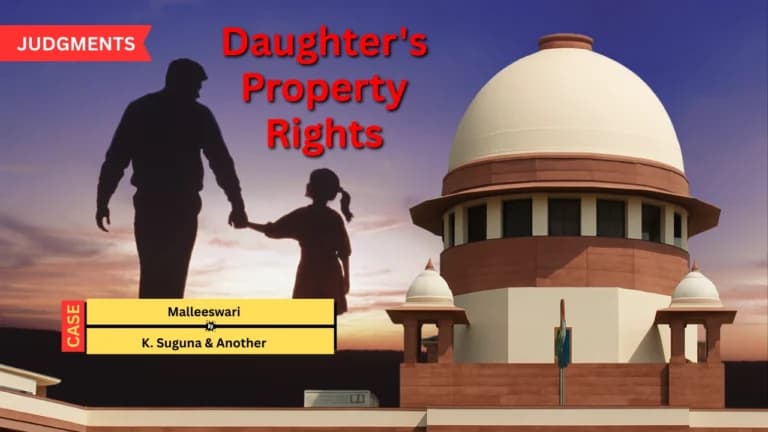The Supreme Court on Monday set aside a Madras High Court review order in a long-running partition dispute, ruling in favour of Malleeswari, daughter of late Munusamy Naidu. The bench of Justices Ahsanuddin Amanullah and S.V.N. Bhatti restored her entitlement under the Hindu Succession (Amendment) Act, 2005, holding that the High Court had overstepped its limited review jurisdiction.
Background
The case traces back to 2000, when Subramani- Malleeswari’s brother-filed a suit seeking partition of family properties. Initially, Malleeswari was not included in the proceedings. A preliminary decree in 2003 allotted shares only to the father and son. Later, portions of the land were sold to one K. Suguna, and other parts settled in Malleeswari’s favour. After her father’s death in 2011, Malleeswari stepped in as his legal heir and sought amendment of the decree to include her rights as a daughter under the 2005 amendment, which grants daughters equal coparcenary rights.
Read also: Karnataka High Court Dismisses Habeas Corpus, Fines ₹2 Lakh for Abuse of Legal Process
The trial court rejected her plea, citing limitation and estoppel, but in 2022 the Madras High Court allowed her claim. That order, however, was reviewed and reversed in 2024, sending the case back for fresh consideration.
Hearing the appeal, the Supreme Court examined whether the High Court’s review order was valid. The bench was clear: “A review petition has a limited purpose and cannot be an appeal in disguise.” The judges noted that the review court had gone beyond correcting errors and instead re-evaluated evidence and findings, something only an appellate court can do.
They emphasized that once a decree is passed, the scope for reopening is narrow unless there is an error apparent on the face of the record. In this case, the High Court had effectively retried the matter under the guise of review.
Read also: Supreme Court Stays Kerala HC Orders Allowing Bail Condition Relaxation for Anitha R. Nair Amid Fraud Case
Decision
Concluding that the High Court had exceeded its jurisdiction, the Supreme Court restored the 2022 order that recognised Malleeswari’s right to a one-third share in the ancestral properties. The civil appeal was allowed, and the trial court has been directed to dispose of pending applications within three months.
Case Title: Malleeswari v. K. Suguna & Another
Citation: 2025 INSC 1080 (Civil Appeal from SLP (C) No. 12787 of 2025)
Date of Judgment: 8 September 2025














